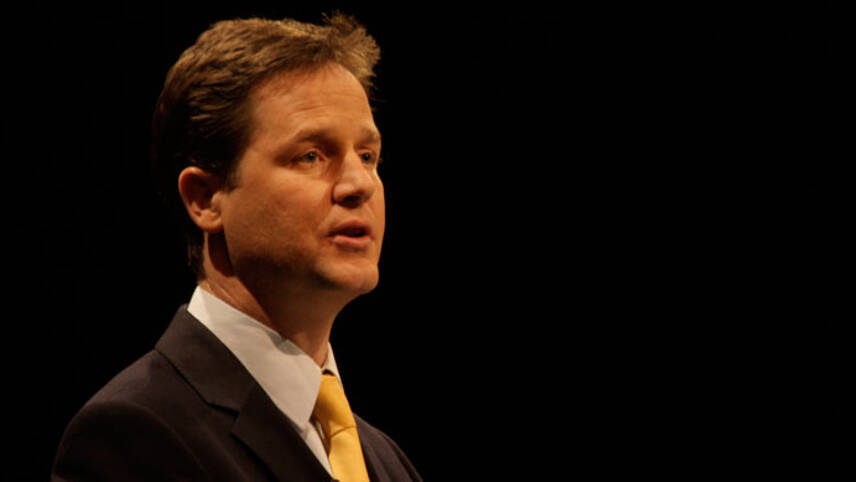Member only content free until 26/05/2024
To continue reading this article and enjoying free access to all Utility Week’s content up to the 26/05/2024 Register today!
Ready to become a member?

The Lib Dems met in Glasgow this week striving to cast themselves as the only true centre ground party, says Mathew Beech.
For the Liberal Democrats, their party conference in Glasgow was very much about trying to re-establish, even rediscover, their identity.
Away from the persistent whispers about who could replace Nick Clegg (Ed Davey, Danny Alexander and Norman Lamb are the names doing the rounds), the Lib Dems are trying to appeal to their core voters and prove they are the same party the electorate voted for back in 2010, not the one tainted by a toxic association with David Cameron’s Conservatives.
This becomes even more significant when viewed in the light of Lord Ashcroft’s latest poll showing the Lib Dems tied for fourth place with the Green Party on 7 per cent of the vote.
Energy secretary Ed Davey was one of the leading Lib Dems shouting about his party’s achievements in government – the top phrase in Glasgow. He claims he and the Lib Dems are behind the “radical” transformation of the energy sector, which has seen the big six’s stranglehold on the market collapse from 98 per cent to 92 per cent.
The Lib Dems are keen to take ownership of the positives that have been coming out of the Department of Energy and Climate Change over the past four years. It is their department; these are their policies; and they are doing everything they can to let everyone know it.
The lesson, with only seven months to go until the general election, has been learnt that they have to push their record of delivery on the doorsteps. They have to remind people that the government is a coalition featuring the Conservatives and the Lib Dems.
The Lib Dems are keen to highlight their green record (the amount of renewables has doubled since 2010), but Davey is also up for the affordability fight with Labour, and has gone toe-to-toe with Labour shadow Caroline Flint on the energy efficiency agenda.
Energy efficiency was Labour’s energy highlight this year. Five million homes over ten years will have their energy efficiency improved, was the pledge from Labour.
Davey promised that the short-lived Green Deal Home Improvement Fund would be jolted back into life with £100 million of new funding. With the promise of insulation and easier switching, coupled with a five-point plan that includes council tax breaks for energy efficient homes, it is clear that the Lib Dems are tackling Labour head on.
The likelihood of a Lib-Lab coalition after May is diminishing, as the Lib Dems realise it would cast them as the nasty party – pushing for further spending cuts and reining in Labour’s spending. It’s not something the party faithful would welcome.
The point of the conference has been to spread distrust of the Tories and Labour, while tackling the Greens by establishing their own environmental credentials. It has been a shifting to the middle ground vacated by the other major parties because of Ukip.
The whole event has been a love letter from the party. They are pleading that they are still the same party voters fell in love with in 2010, and that they have laid back and thought of England when bunking up with the Tories.
If successful, the Lib Dems will be back in government limiting Labour’s instinctive desire to spend, spend, spend, or reining in the Conservatives’ cuts, cuts, cuts.
If the wooing fails to entice the voters back, there is always the possibility – whisper it – that Davey could get the top (Lib Dem) job.
The key questions:
Our roving political correspondent Mathew Beech covered all three main party conferences and put the same important questions to senior politicians at each.
What is the future for Ofgem?
I do understand the frustrations that people have had with Ofgem. What we have done is take through additional powers so that Ofgem has had its role beefed up and we now also have the investigation into the energy market, which is going to be very welcome and the CMA has got significant power that make it far from toothless. There is cause for optimism on the horizon for energy.
Jo Swinson, consumer affairs minister
What is the most important part of the energy trilemma (affordability, sustainability, security)?
“I don’t agree with the Conservatives and Labour that there is this trade-off between going green and affordability. If you want to cut your energy bills permanently, the best way is energy efficiency.
“That can cut your bills permanently and your carbon emissions. So you can go green and have permanently lower bills. It’s really depressing that the Conservatives and the Labour party haven’t understood that.”
Ed Davey, energy secretary
Are the water companies treating customers fairly?
“Fairness is in the eye of the beholder.
“Going in to the next [price review] period, we will have a process that is more open and allows people to understand how the companies operate. Companies understand the needs of their customers and how to offer a great customer service. They’ve moved on a great deal [since privatisation].
“In terms of price, we will see something that much more reflects the costs that companies have, and the fact that prices will not see a huge increase is really positive.”
Dan Rogerson, water minister
Please login or Register to leave a comment.